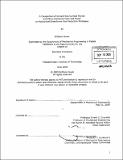| dc.contributor.advisor | Ernest G. Cravalho. | en_US |
| dc.contributor.author | Guyer, Brittany (Brittany Leigh) | en_US |
| dc.contributor.other | Massachusetts Institute of Technology. Dept. of Mechanical Engineering. | en_US |
| dc.date.accessioned | 2010-04-28T15:37:13Z | |
| dc.date.available | 2010-04-28T15:37:13Z | |
| dc.date.copyright | 2009 | en_US |
| dc.date.issued | 2009 | en_US |
| dc.identifier.uri | http://hdl.handle.net/1721.1/54470 | |
| dc.description | Thesis (S.B.)--Massachusetts Institute of Technology, Dept. of Mechanical Engineering, 2009. | en_US |
| dc.description | Cataloged from PDF version of thesis. | en_US |
| dc.description | Includes bibliographical references (p. 27-28). | en_US |
| dc.description.abstract | Both ground source heat pumps operating on electricity and micro-combined heat and power systems operating on fossil fuels offer potential for the reduction of green house gas emissions in comparison to the conventional approaches for providing heating, air conditioning and electric power to residential homes. Factors that may impact the relative merits are actual system operating efficiencies, regional primary energy sources for electric power generation, actual space conditioning and electric demands as well as regional climate factors. The purpose of this study is to make a consistent, realistic comparison of these greenhouse gas reduction strategies as applied to typical single-family residential homes across the United States. The study identifies both the regional variations and specific magnitudes of reductions that could be expected with these technologies when implemented within the current energy infrastructure. These comparisons are achieved by identifying the performance characteristics of both technologies, developing typical application scenarios and collecting important regional data associated with electric power production and climate variations. The results show that indeed regional variations exist in the relative merits of micro-CHP systems and ground source heat pumps on reducing the carbon emissions for households. Specific results are sensitive to the assumptions made regarding the carbon production characteristics of incremental increases or decreases of electrical demand on the local electricity utility grid. | en_US |
| dc.description.statementofresponsibility | by Brittany Guyer | en_US |
| dc.format.extent | 44 p. | en_US |
| dc.language.iso | eng | en_US |
| dc.publisher | Massachusetts Institute of Technology | en_US |
| dc.rights | M.I.T. theses are protected by
copyright. They may be viewed from this source for any purpose, but
reproduction or distribution in any format is prohibited without written
permission. See provided URL for inquiries about permission. | en_US |
| dc.rights.uri | http://dspace.mit.edu/handle/1721.1/7582 | en_US |
| dc.subject | Mechanical Engineering. | en_US |
| dc.title | A comparison of ground source heat pumps and micro-combined heat and power as residential greenhouse gas reduction strategies | en_US |
| dc.type | Thesis | en_US |
| dc.description.degree | S.B. | en_US |
| dc.contributor.department | Massachusetts Institute of Technology. Department of Mechanical Engineering | |
| dc.identifier.oclc | 555969544 | en_US |
